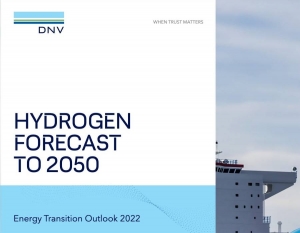


(Posted on 20/06/22)
Hydrogen has a crucial role in decarbonizing the world’s energy system, but uptake will be too slow. Governments need to make urgent, significant policy interventions, according to a new report by DNV.
In Hydrogen Forecast to 2050, DNV predicts the amount of hydrogen in the energy mix will be only 0.5% in 2030 and 5% in 2050. However, to meet the targets of the Paris Agreement, hydrogen uptake would need to triple to meet 15% of energy demand by mid-century.
“Hydrogen is essential to decarbonize sectors that cannot be electrified, like aviation, maritime, and high-heat manufacturing and should therefore be prioritized for these sectors,” said Remi Eriksen, Group President and CEO of DNV. “Policies do not match hydrogen’s importance. They will also need to support the scaling of renewable energy generation and carbon capture and storage as crucial elements in producing low-carbon hydrogen.”
According to Hydrogen Forecast to 2050, electricity-based green hydrogen – produced by splitting hydrogen from water using electrolysers – will be the dominant form of production by the middle of the century, accounting for 72% of output. This will require a surplus of renewable energy, to power an electrolyser capacity of 3,100 gigawatts. This is more than twice the total installed generation capacity of solar and wind today.
Blue hydrogen – produced from natural gas with emissions captured – has a greater role to play in the shorter term (around 30% of total production in 2030), but its competitiveness will reduce as renewable energy capacity increases and prices drop.
Global spend on producing hydrogen for energy purposes from now until 2050 will be USD 6.8tn, with an additional USD 180bn spent on hydrogen pipelines and USD 530bn on building and operating ammonia terminals, according to DNV’s forecasts.
Cost considerations will lead to more than 50% of hydrogen pipelines globally being repurposed from natural gas pipelines, as the cost to repurpose pipelines is expected to be just 10-35% of new construction costs. Hydrogen will be transported by pipelines up to medium distances within and between countries, but not between continents. Global hydrogen trade will also be limited by the high cost of liquefying hydrogen for ship transport and the low energy density of hydrogen. The hydrogen derivative ammonia, which is more stable and can be more readily transported by ship, will be traded globally.
Early uptake of hydrogen will be led by hard-to-abate, high-heat manufacturing processes such as iron and steel production which currently use coal and natural gas. Hydrogen derivatives, such as ammonia and methanol, are key to decarbonizing heavy transport like shipping and aviation, but these fuels won’t scale until the 2030s according to DNV’s forecasts.
Hydrogen will not see uptake in passenger vehicles, and only limited uptake in power generation. Hydrogen for heating of buildings will not scale globally, but will see early uptake in some regions that already have extensive gas infrastructure.
“Scaling hydrogen value chains will require managing safety risk and public acceptance, as well as employing policies to make hydrogen projects competitive and bankable. We need to plan at the level of energy systems, enabling societies to embrace the urgent decarbonization opportunities presented by hydrogen,” added Eriksen.
AtoB@C Shipping, a subsidiary of ESL Shipping, has announced the successful delivery of Fleximar, the... Read more
Western Bulk, together with reputable Norwegian partners A/S J. Ludwig Mowinckels Rederi, Premium Maritime... Read more
Pacific Basin Shipping Limited, one of the world’s leading dry bulk shipping companies, has announced... Read more
Columbia Group anticipates a period of strong expansion as an increasing number of international shipowners... Read more
Norse?Ship Management has expanded its use of Smart Ship Hub’s high frequency sensor data and... Read more
As the maritime industry gears up to welcome the IMO’s STCW bullying and harassment training amendments... Read more
NORDEN has acquired the cargo activities of Taylor Maritime in Southern Africa (previously operated... Read more
Philippos Ioulianou, Managing Director of EmissionLink, has warned the IMO’s decision to delay... Read more
VIKAND has highlighted the need for cultural change in the maritime sector as reports of bullying, harassment... Read more
The maritime industry is experiencing a period of significant transformation, driven by rapidly evolving... Read more